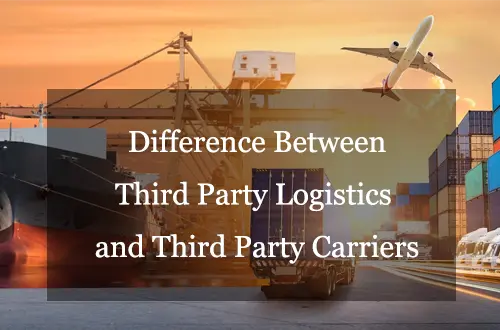Difference Between Third Party Logistics and Third Party Carriers
As modern market demands continue to evolve and competition intensifies, companies are constantly faced with critical decisions that affect the trajectory of their operations. The importance of making the right choice has never been more apparent. Whether you are an emerging startup looking to streamline your transportation operations or an established business looking to optimize efficiency and reduce costs, the decision between a 3PL and a third-party carrier requires careful consideration and strategic forethought. How do you determine whether to outsource transportation services to a third-party provider? Should you choose a third-party logistics (3PL) company or a third-party carrier?

Drawing on years of industry expertise and insights gained from seasoned professionals, we'll explore the unique features, benefits, and considerations associated with 3PL providers and third-party operators.
Under what circumstances do companies need to outsource logistics to third-party service providers?
Capacity restrictions
When a company's internal transportation resources are insufficient to handle a sudden surge in shipments or an unexpected surge in demand, they may turn to third-party logistics service providers to supplement capacity and ensure timely delivery.
Professional setting
If the shipment requires specialized equipment or handling capabilities, such as refrigerated trucks for perishable cargo or flatbed trailers for oversized cargo, they can hire a third-party logistics provider with the necessary equipment and expertise.
Geographic coverage
When companies expand into new markets or regions that lack established transportation networks, leveraging third-party logistics providers allows them to gain broader geographic coverage without requiring large investments in infrastructure.
seasonal demand
Businesses that experience seasonal fluctuations in shipping volumes, such as during the holiday season or peak shopping periods, may rely on third-party logistics to effectively and cost-effectively manage temporary increases in demand.
cut costs
Outsourcing transportation to a third-party logistics provider may be more cost-effective than maintaining an in-house fleet, especially for businesses with irregular transportation patterns or fluctuating demand levels.
Flexibility and scalability
Third-party logistics providers offer flexibility and scalability, allowing businesses to adjust shipping capabilities to changing needs without the long-term commitment or overhead associated with owning and operating their own fleet.
Focus on core competencies
By outsourcing transportation logistics, companies can focus their resources and attention on core competencies, such as product development, marketing, or customer service, while leaving the transportation aspects to specialized providers.
reduce risk
Can help reduce transportation-related risks such as regulatory compliance, liability for accidents or damage, and disruptions caused by unforeseen events such as natural disasters or strikes.
How should you choose third-party logistics or third-party carriers?
Scope of services required
If your shipping needs extend beyond shipping, such as warehousing, inventory management, order fulfillment, and supply chain optimization, then a 3PL provider may be a better choice. They offer a complete suite of logistics services tailored to your needs.
If your main concern is moving your goods point-to-point without additional logistics services, then a carrier service may be enough.
If you want to know more detailed service scope, you can view it through this content: What are the services and functions provided by third-party logistics?
Shipment volume and frequency
If you have regular, high-volume shipping needs, a 3PL provider can provide dedicated resources, optimize routes, and provide cost-effective solutions to manage your logistics operations.
But for businesses with sporadic or seasonal shipping needs, hiring a third-party carrier for individual shipments on a transactional basis may be more appropriate, as it provides flexibility without the need for a long-term commitment.
Geographic scope and professional requirements
Evaluate the shipping destination and any special requirements the cargo may have, such as temperature-controlled shipping, hazardous materials handling, or special equipment needs.
A third-party logistics provider with extensive geographic coverage and expertise in managing different freight types can provide tailor-made solutions to effectively meet your specific requirements.
Third-party carriers with specialized equipment or expertise in specific shipping modes or routes may be better suited for niche or specialty shipping.
cost considerations
Compare the costs associated with outsourcing transportation to a third-party logistics provider versus a third-party carrier. Consider factors such as shipping rates, additional service fees, warehousing costs (if applicable), and any long-term commitments or contracts.
Request quotes from multiple providers and evaluate the overall value proposition, considering service quality, reliability and efficiency in addition to cost.
Technology and integration capabilities
Evaluate the technology and integration capabilities of potential service providers. Look for providers that offer advanced tracking and visibility tools, integration with existing systems (e.g., ERP, inventory management), and real-time communications to streamline operations and improve visibility across the supply chain.
Your transportation business is as unique as the goods you transport. Whether you require an end-to-end logistics solution or professional shipping services, it is crucial to determine your specific needs and goals before making a decision. We understand that your transportation business's needs may change over time. That’s why we offer scalable solutions to adapt to your changing needs, providing flexibility to accommodate fluctuations in volume, seasonal demand and market dynamics.
At chinadivision, we pride ourselves on providing customized solutions that meet each client's individual needs. Whether you require comprehensive logistics services or specialized transportation solutions, our team of experts is dedicated to designing customized strategies to optimize efficiency, reduce costs and enhance your competitive advantage.





